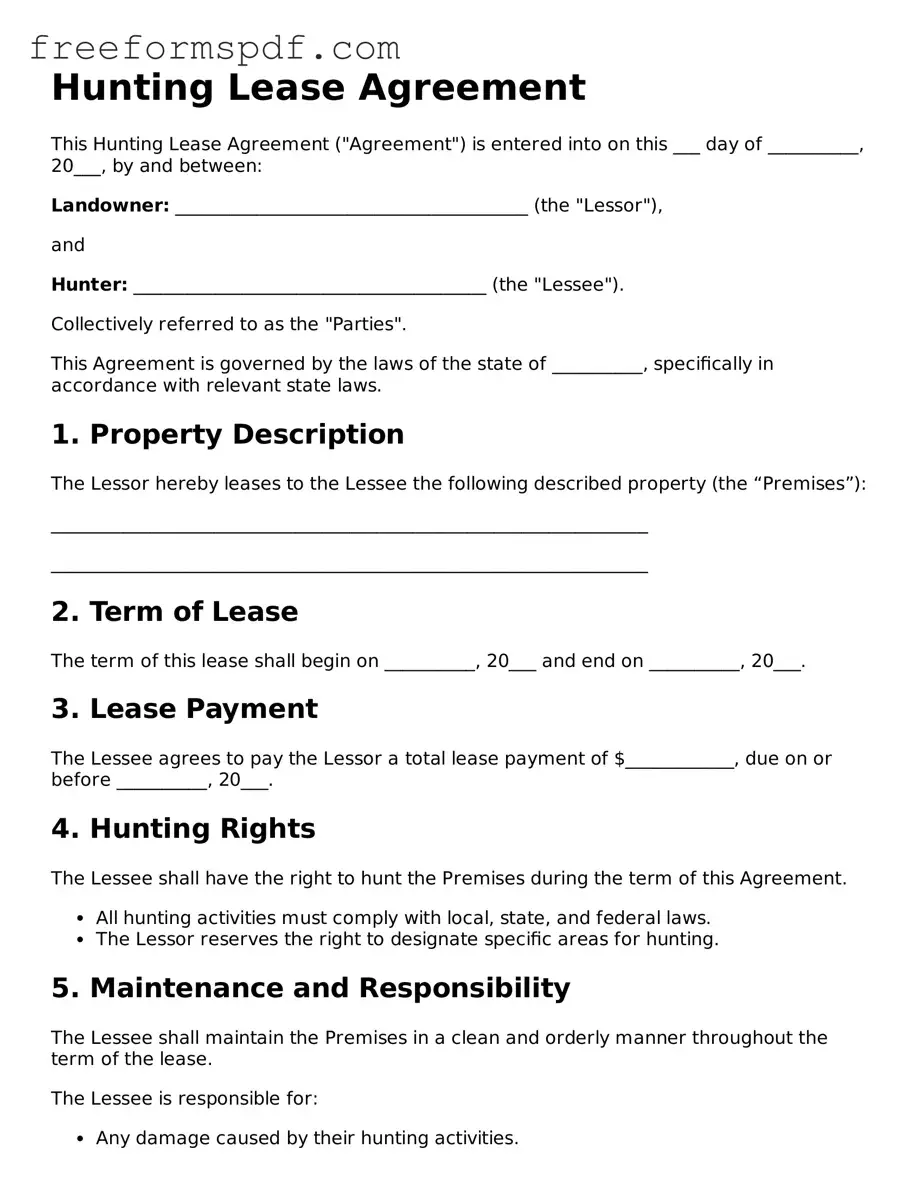Hunting Lease Agreement Document
Common mistakes
-
Failing to read the entire agreement thoroughly. Many people rush through the form and miss important details that could affect their rights and responsibilities.
-
Not providing accurate personal information. Mistakes in names, addresses, or contact details can lead to confusion and potential legal issues.
-
Overlooking the lease duration. Some individuals forget to confirm the start and end dates, which can lead to misunderstandings later on.
-
Ignoring the payment terms. It's crucial to clearly understand the rental amount and payment schedule to avoid disputes.
-
Neglecting to clarify property boundaries. Without a clear description of the leased area, conflicts with neighboring landowners may arise.
-
Not discussing rules and regulations. Each lease may have specific guidelines regarding hunting practices. Failing to address these can result in penalties.
-
Forgetting to sign and date the agreement. An unsigned document is not legally binding, which renders the lease ineffective.
Learn More on This Form
-
What is a Hunting Lease Agreement?
A Hunting Lease Agreement is a legal document that outlines the terms under which one party (the lessor) allows another party (the lessee) to hunt on their land. This agreement specifies the rights and responsibilities of both parties, including the duration of the lease, payment terms, and any restrictions on hunting activities.
-
Who should use a Hunting Lease Agreement?
This agreement is beneficial for landowners who want to lease their land for hunting purposes and for hunters seeking a designated area to hunt legally. It helps ensure that both parties understand their rights and obligations, thereby reducing the potential for disputes.
-
What are the key components of a Hunting Lease Agreement?
A comprehensive Hunting Lease Agreement typically includes the following elements:
- Identification of the parties involved
- Description of the leased property
- Duration of the lease
- Payment details, including amount and due dates
- Rules and regulations regarding hunting
- Liability and insurance provisions
- Termination conditions
-
How long does a Hunting Lease Agreement last?
The duration of a Hunting Lease Agreement can vary widely. Some leases are for a single hunting season, while others may extend for multiple years. The specific term should be clearly stated in the agreement to ensure both parties are aligned on the timeline.
-
Can the Hunting Lease Agreement be modified?
Yes, modifications to the agreement can be made if both parties agree to the changes. It is important to document any amendments in writing and have both parties sign the updated agreement to maintain clarity and legal standing.
-
What happens if one party violates the agreement?
If either party fails to adhere to the terms of the Hunting Lease Agreement, the other party may have grounds for termination of the lease. The agreement should outline the procedures for addressing violations, which may include notice periods or opportunities to remedy the breach.
-
Is it necessary to have a lawyer review the Hunting Lease Agreement?
While it is not legally required to have a lawyer review the agreement, it is highly recommended. A legal professional can provide valuable insights, ensuring that the document is fair and compliant with state laws. This step can help protect the interests of both the landowner and the hunter.
Misconceptions
Understanding the nuances of a Hunting Lease Agreement is essential for both landowners and hunters. However, several misconceptions can lead to confusion. Below is a list of common misconceptions about this important document.
- Misconception 1: A Hunting Lease Agreement is only necessary for large properties.
- Misconception 2: The agreement is only about money.
- Misconception 3: Once signed, the lease cannot be changed.
- Misconception 4: Only the landowner needs to sign the agreement.
- Misconception 5: A verbal agreement is sufficient.
- Misconception 6: The lease automatically renews each year.
This is not true. Even small parcels of land can benefit from a written agreement. A lease helps clarify expectations and responsibilities, regardless of the property's size.
While financial terms are important, a Hunting Lease Agreement covers various aspects, including land use, duration of the lease, and rules for hunting. These elements ensure that both parties are on the same page.
This is misleading. Amendments can be made to a Hunting Lease Agreement if both parties agree. It is important to document any changes in writing to avoid future disputes.
Both the landowner and the hunter should sign the agreement. This mutual consent ensures that both parties are legally bound to the terms outlined in the document.
While verbal agreements may seem convenient, they are often difficult to enforce. A written Hunting Lease Agreement provides clear evidence of the terms and can protect both parties in case of disagreements.
This is not always the case. Many Hunting Lease Agreements are set for a specific term and do not renew automatically. It is crucial to review the terms to understand the renewal process.
Other Types of Hunting Lease Agreement Forms:
Short Term Lease Agreement - Lists the payment methods accepted for the rental fee.
Parking Agreement Contract - Addresses the issue of public access to the garage area.
When entering into a rental arrangement, it is essential for both landlords and tenants to have a clear understanding of the terms laid out in the lease; utilizing the Arizona PDF Forms can greatly assist in creating a valid legal document that reflects the agreement between the parties and provides them with the necessary protections during the lease period.
Non Renewal Tenant Sample Letter to Landlord Not Renewing Lease - Written communication regarding the timeline and process for lease expiration.
